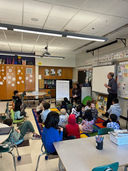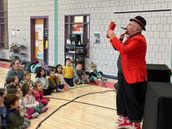Creative Arts & Sciences
Creative Arts & Sciences (CAS) coordinates school-wide and grade-specific programs that support the curriculum, welcoming performers, scientists and authors into the school (ongoing September to June). Meet the team.
CAS updates will be posted in the weekly Pulse. This effort is funded by Sprague parents like you, so be sure to Donate to the Sprague PTO to support your child's enrichment!
Want to volunteer as a Parent Rep? Email Sprague CAS Chair.
View the CAS Calendar!
Note: the events currently listed below are from the 2023-24 school year.

Meet the 2024-25 CAS Team
Chair: Carolyn Kornwitz
cas@spragueschoolpto.com

Kindergarten

1st Grade

2nd Grade
Jill Wells: jpollyniak@gmail.com
Hande Alparslan: hehande@gmail.com
Louisa Blumenthal:
blumenthall@wellesleyps.org

3rd Grade
Mary Tricolli: mbtricolli@gmail.com
Jennifer Lundbohn: lundbohnj@wellesleyps.org

4th Grade
Melissa Lacy: mapalmer07@gmail.com
Jo Kaplan Lee: jokaplee@gmail.com
Taryn Drake: draket@wellesleyps.org

5th Grade
Jill Wells: jpollyniak@gmail.com
Moe Henzel: henzelm@wellesleyps.org
Ecotarium
Kindergarten, March 20
The EcoTarium visited kindergarten classes this past Wednesday! They were introduced to building houses, bridges and buildings! The challenge was, “Can your structure withstand elements-a hurricane, heavy snow and storms?” All of them were amazed that is not concrete that holds up a structure- it’s engineering!
As a follow up you could ask the “what do you need to build a strong structure? “How does the weather affect a structure?” “Can a tornado blow it down?” “Can an earthquake shake a structure?” “Can heavy snow crush a roof?”

Discovery Museum Presents Sound Waves
4th Grade, January
The Discovery Museum of Acton, MA visited the 4th Grade students this week for a hands-on workshop about Sound Waves. Students actively engaged in exploring the source of sound and created unique sound makers with household materials.
Ask your 4th grader the following questions about their experience:
-
What exactly is sound and how is it created? (Sound is energy created by vibrations)
-
Can you think of a place where there is no sound? Why isn't there sound there?
-
How can you move a ball with a tuning fork without actually touching it?
-
Is sound fastest through a solid, liquid or gas? (The answer is solid)
-
Do sound waves look like ocean waves? How would you describe them?

Bash the Trash
All-School Event, March 6
On Wednesday, March 6th Bash the Trash, an environmental education and musical performance group, visited Sprague, doing assemblies for K-2 and 3-5 separately. The performers - Jessica, JJ and Trevor - captivated the students' attention with ease as they weaved musical and scientific terms throughout their performance. The students hypothesized what noise different materials would make as the artists performed. The performers played instruments made out of all sorts of found, recycled materials and engaged the students in call and response, collaborating on a musical piece together at the end!
Ask your student:
-
What are the three "r's" they discussed and how are they important?
-
How can we reduce? How can we reuse?
-
What are some examples of materials that the performers used for their instruments?
-
What materials could you use to make a guitar at home?

Potato Hill Poetry
Grade 2, March 8
This past Friday, the 2nd Graders enjoyed a visit and poetry workshop with Andrew Green of Potato Hill Poetry. In addition to reading poems and writing their own poems, the students learned Andrew’s favorite habit for keeping track of ideas; he always carries a pocket sized notebook because he never knows when an idea will inspire him. Andrew also told us “ Poetry belongs to us all” and encouraged the students to write about anything and everything in their lives.
Nature, food, sports and people are all great jumping off points for poetry writing. The important part is to pay attention, observe and then describe.
Ask your second grader about some poetry writing prompts. For example:
-
What matters to you?
-
Also using the 5 W’s: Who, What, When, Where, and Why can be helpful to structure your poem.
-
Another way to help structure poems is by using the 5 senses ( taste, touch, smell, sight and sound) as prompts.
For more information on Potato Hill Poetry as well as info about their Summer Writing program visit: https://www.potatohill.com/

JFK Museum Visit
5th Grade, January
The Sprague fifth graders enjoyed a visit to the JFK Presidential Library and Museum last week. (The Hunnewell fifth graders will be going this week). The field trip focused on civil rights and civic action, especially the varied ways that people bring about change. They also learned how President Kennedy was involved in the civil rights movement during his presidency.
Ask your 5th grader:
-
What are some ways people engage in civic action?
-
At what age can someone start?
-
Who are some people who engaged in civic action at a young age and what did they do?

Discovery Museum Presents Force & Motion
Kindergarten
Students explored concepts of force and motion while interacting with a variety of toys, balls, and vehicles.
Ask your Kindergartener:
-
What makes an object move?
-
Can we control the movement?
-
Does the strength of a push or pull have an effect?
-
How about the direction of the push or pull?
-
What happens when objects move past each other or collide?

Origamido
4th Grade, December 20
Our fourth graders had a fun and interactive visit from Michael, of Origamido. His presentation was fantastic! He used origami paper to teach math and geometry. The students folded paper following his direction making squares and triangles talking through different degrees of angles, vertices, and so much more. Hopefully some of the children's paper creations made it home for you to admire in person!
Ask your 4th grader:
-
Can you fold 2 pieces of paper into triangles, place the short sides together and make a quadrilateral parallelogram that is not a rectangle?
-
What is the difference between acute, obtuse and right angles?
-
Can you fold a piece of paper to make a trapezoid quadrilateral with only 1 set of parallel lines?
-
How can your origami shapes act like a calculator?
-
How can you use an isosceles triangle to make a fox out of paper?

Rob Buyea Author Visit
5th Grade, December 12
Our fifth graders were visited by author, Rob Buyea. He led a great presentation and workshop to all the 5th grade students at Spraguewell discussing his books, Because of Mr. Terupt Series and the Perfect Score Series.
Mr. Buyea explained how his ideas and characters are based on real events, experiences & memories in his life as a teacher and dad. He talked about his writing switch always being on and how he is always thinking about new ideas. The kids were super engaged! He then went to all the classes to lead a writers' workshop, in which he helped the students draft a fun story coming from the narrative of one of his characters in the book, which was enjoyed by all!
Ask your 5th grader to share their experience writing their story, or even to read it to you!

Jerry Pallotta Author Visit
1st Grade, December 4
Ask your 1st grader about author Jerry Palotta's visit! They enjoyed a visit from Jerry Pallotta, the author of the "Who Would Win" series. Children learned about the author's family, adventures, and his book writing process through stories and picture slideshows. They also received a surprise gift from Jerry, an autographed book. The author presented the class with his book :"The EyeBall Alphabet Book". Jerry's friend, author Barbara Barbieri McGrath stopped by to say "Hello" and gifted the classrooms a few of her books.

Word Play!
Kindergarten, November 29
Word Play" uses clowning and puppetry to take audiences on an adventure through the alphabet. Words come to life in the hands of two skilled performers, who clown around with sounds and letters to create dozens of interactive characters and imaginative scenes. Audiences can make friends with vowels, teach tricks to a “C-A-T” and “D-O-G,” and visit a whole ZOO full of surprises. It’s the perfect blend of education and entertainment—a play on words, literally!

Nature Walk with Lisa Moore, NRC
1st Grade, October 27
As your FIRST GRADER about their very first "field trip" - a nature walk with Lisa Moore around the Sprague campus. She showed the many ways Sprague is a great habitat for many animals - from bunnies to deer to many species of birds - and how both animals and plants adapt to changes in weather and prepare for winter. The students saw examples of different kinds of seeds and how they are spread (fur, wind or...poop!)

Leland Walker: Storytelling-Walker Between Worlds
2nd Grade, October 27
Ask your SECOND GRADER about their special visit from Leland Faulkner, member of the Bad River Band of Chippewa tribe Mr. Faulkner gave a highly engaging performance sharing Native American heritage, mythology and fables.
Ask your child:
-
What is the story of how the Dream Catcher was created and why?
-
How do you say “greetings” in Ojibwe? (Answer—Boozhoo)
-
How is North America referred to by many Indigenous people? (Answer- Turtle Island*)
*The name comes from several Indigenous oral histories with different variations, however a common version tells the story of a turtle that holds the world on its back.

Nature Walk with Lisa Moore, NRC
4th Grade, October 25
Ask your FOURTH GRADER about their nature walk with Lisa Moore around the Sprague campus! Topics of discussion included our Earth's changing surface, weather, erosion and deposition.

Plimoth Patuxet Peoples of the Dawn Land
3rd Grade, October 16
Ask your student about Plimoth Patuxet People's of the Dawn Land in-class presentation! An Indigenous museum educator discussed Wampanoag People's relationship to the land, respect for all living beings, and seasonal ways of life.

Discovery Museum Presents Weather!
Kindergarten, October 16
Ask your KINDERGARTENER about their first CAS event! They had an in-class presentation about weather given by staff of the Discovery Museum! Our kindergarteners learned about the important role weather plays in daily life, the practice of using science and engineering by developing tools for forecasting and observing day-to-day changes and seasonal patterns over time.

Dr. "The Machine" Jesse Green
All-School Assembly, October 11
We had our first all-school CAS assembly with the dynamic and hilarious speaker Jesse "The Machine" Green in his motivational talk called "Chainsaws, Cheeseburgers and Rock and Roll." We learned about his life and events that led him to create wood carving masterpieces and have his very own TV show! He had us laughing and engaged with his slideshow and wit!




































































































































